Choosing the right donor management software is crucial for nonprofits seeking to optimize their fundraising efforts and streamline donor relationships. In this comprehensive guide, we explore ten popular donor management software platforms and provide key criteria to help you make an informed decision tailored to your organization’s needs.
What Is Donor Management Software?
Donor management software is a specialized tool designed to help organizations manage and streamline relationships with their donors and supporters.
The software centralizes donor information, enabling organizations to store and access data such as contact details, donation history, communication preferences and engagement activities. These systems provide valuable insights into fundraising performance and donor behavior with features for tracking donations, pledges and grants.
Donor management software typically facilitates communication with donors through email marketing, newsletters and personalized messages, helping organizations nurture relationships and cultivate donor loyalty. Some platforms offer integration with online fundraising tools, event management systems, and even social media platforms, streamlining fundraising efforts and expanding outreach capabilities. Advanced donor management software may also include analytics and reporting capabilities, through which organizations can assess campaign effectiveness, identify trends and make data-driven decisions to optimize fundraising strategies.
Who Uses Donor Management Software?
Nonprofit Organizations
Donor management software was essentially created for nonprofits since these organizations rely heavily on donations to operate. Various teams within an organization use the software for different purposes:
- Development and fundraising teams use it to manage donor relationships, track donations and strategize fundraising efforts.
- Executive leadership teams monitor fundraising goals, analyze performance metrics and make strategic decisions based on insights gathered via the software.
- Marketing and communications teams use it to coordinate outreach campaigns, communicate with donors and maintain brand consistency.
- The finance and accounting departments rely on it to track financial transactions, reconcile donations and generate financial reports.
Educational Institutions
Schools, colleges, universities and other learning institutions leverage donor management systems in their advancement, development and alumni relations offices. Specifically, these tools are used to:
- Cultivate relationships with alumni, parents and other donors
- Strategize, execute and manage fundraising campaigns
- Coordinate fundraising events and initiatives
- Maintain donor databases
- Track donations
- Analyze fundraising performance
Healthcare Organizations
Development and philanthropy teams at hospitals, health clinics and medical research institutions use donor management tools in much the same way as educational institutions. Additionally, patient advocacy groups may use these tools to raise public awareness around critical healthcare issues.
Political Campaigns and Advocacy Groups
In addition to coordinating fundraising efforts, tracking donations and engaging with donors and supporters, political campaign managers and communications teams use donor management software to analyze donor demographics and adjust communications strategies accordingly, as well as maintain brand consistency across all marketing collateral.
What Size Organizations Should Use Donor Management Software?
The size of the organization matters when it comes to using (or even needing to use) donor management software. For example, larger nonprofits may benefit the most from these tools due to multiple factors:
- Resource availability: Large nonprofits typically have more resources, both financial and human, to invest in sophisticated donor management software. They can afford to purchase more comprehensive systems and allocate more staff for implementation and maintenance.
- Complexity of operations: The size of a nonprofit often correlates with the complexity of its operations. Larger organizations may have multiple fundraising campaigns, diverse donor segments and extensive programs, requiring robust donor management software to effectively handle these complexities.
- Scale of donor relationships: Large nonprofits tend to have a more substantial and diverse donor base. This requires a comprehensive donor management system that can handle high volumes of data and facilitate personalized communication and engagement strategies.
- Reporting and analytics needs: Larger nonprofits often have more stringent reporting requirements due to regulatory compliance, stakeholder expectations and internal governance structures. They need donor management software that can provide sophisticated analytics and customizable reporting to track fundraising performance and demonstrate impact.
- Integration with other systems: Large nonprofits may have existing systems for finance, marketing and program management, so donor management software that offers robust integration capabilities is crucial for streamlining operations and maintaining data integrity across the organization.
- Scalability: As nonprofits grow in size, their donor management needs evolve, so scalability becomes a critical factor in choosing donor management software. Larger nonprofits require software that can scale with their organization, accommodating increased data volume, user access and functionality as the organization expands its operations and donor base.
- Strategic planning: Large nonprofits often have long-term strategic plans that involve ambitious fundraising goals and expansion objectives. Donor management software plays a vital role in executing these strategies by providing insights into donor behavior, identifying trends and informing decision-making processes. The software must align with the organization’s strategic goals and support its growth trajectory.
The Benefits of Using Donor Management Software
In addition to making it easier to track incoming donations, donor management software benefits nonprofits in the following ways:
- Improves donor engagement, stewardship and communication
- Helps to expand outreach
- Enhances efficiency and transparency around fundraising efforts
- Enables better tracking of donation history and trends
- Provides insights into fundraising performance and donor behavior
- Enables customizations of reporting and analytics capabilities
- Can integrate with other organizational systems
- Helps ensure compliance with data privacy regulations
- Can scale to accommodate organizational growth
10 Donor Management Software Tools [Free & Paid]
The following tools were selected based on their comprehensive features and ease of use; they are ranked in no particular order. Some are free (or offer free tiers), and some are paid, but all provide a robust suite of capabilities that help nonprofit organizations of all sizes significantly streamline their fundraising efforts.
Free Donor Management Tools
CiviCRM is an open-source constituent relationship management solution specifically designed for nonprofits. It provides robust tools for contact management, fundraising, event planning and more.
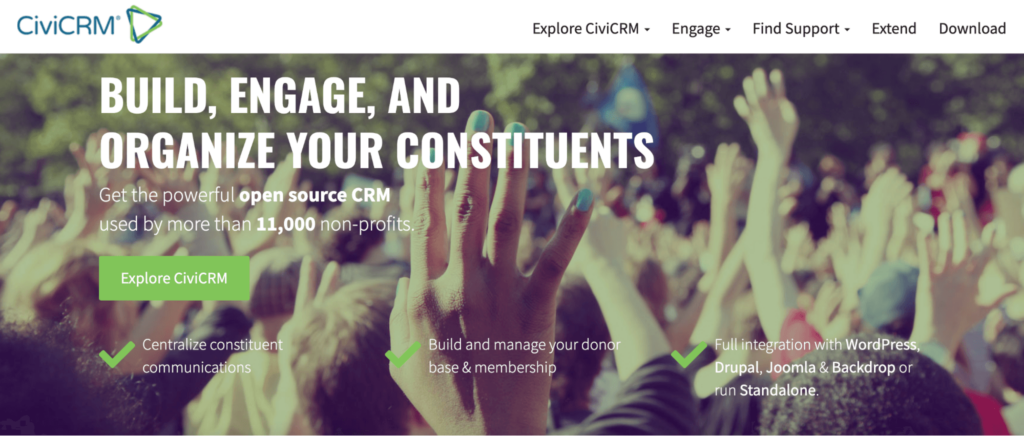

- Price: Free (open-source)
- Most Helpful Feature: Highly customizable and extensible with a wide range of extensions available
- Pro Tips: Take advantage of the community support and extensive documentation available. Use extensions to tailor the software to your specific needs.
- Usability Rating: ★★★☆☆
Donorbox is a powerful and user-friendly fundraising software that helps nonprofits manage one-time and recurring donations, track donors and create customizable donation forms.
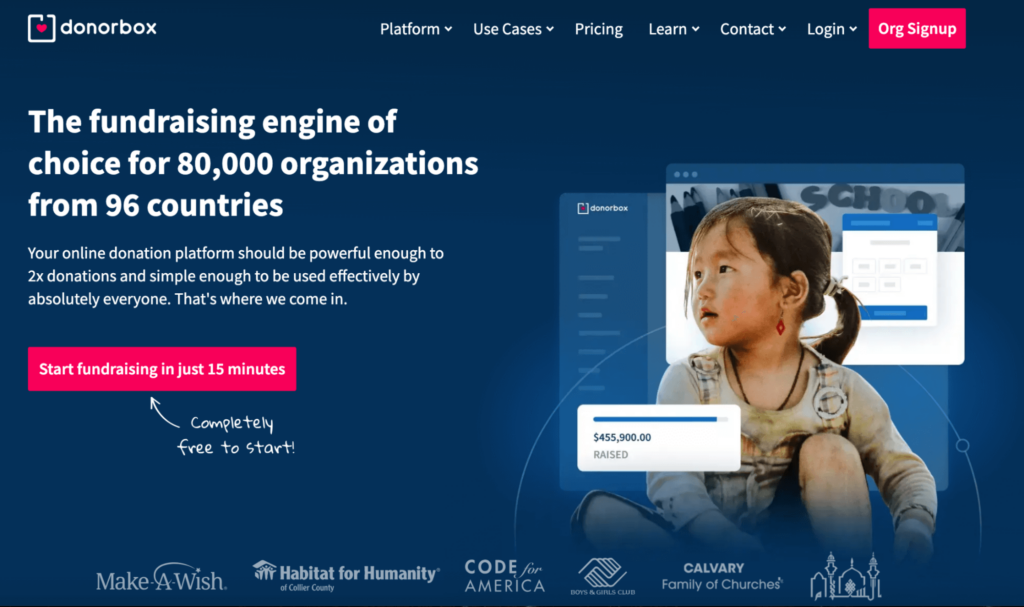

- Price: Free with a 1.5% platform fee on donations (premium plans available)
- Most Helpful Feature: Easy-to-use donation form builder that integrates seamlessly with websites
- Pro Tips: Use the recurring donation feature to maximize donor retention. Customize your donation forms to match your branding for a cohesive donor experience.
- Usability Rating: ★★★★☆
HubSpot CRM is a free, user-friendly CRM platform that offers contact management, email tracking, deal tracking and more. It’s designed specifically to help organizations grow and manage donor relationships.
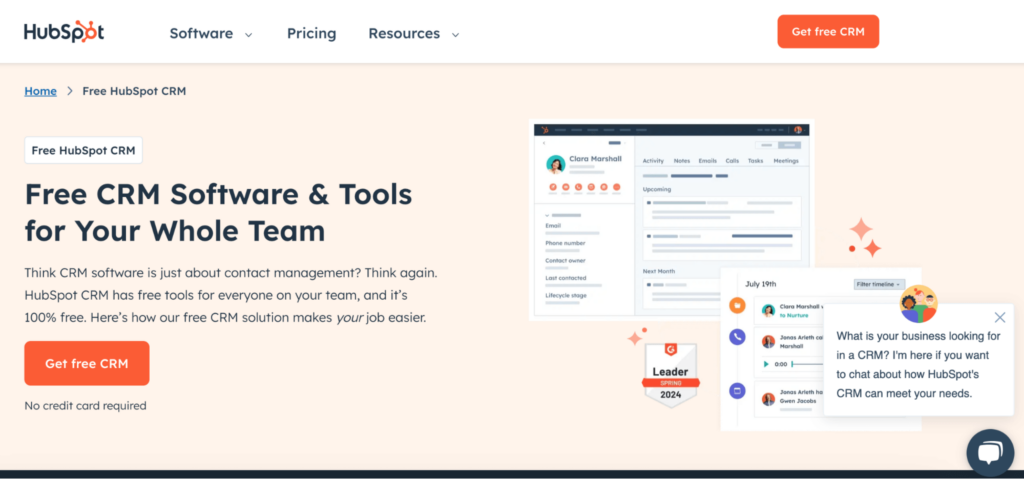

- Price: Free (premium features available)
- Most Helpful Feature: Comprehensive contact management and email tracking capabilities.
- Pro Tips: Utilize the integrations with email and social media to manage all your communications from one place.
- Usability Rating: ★★★★☆
Salesforce Nonprofit Success Pack (NPSP)
Salesforce NPSP is a powerful and customizable CRM solution tailored for nonprofits. It offers extensive features for donor management, fundraising and program management.
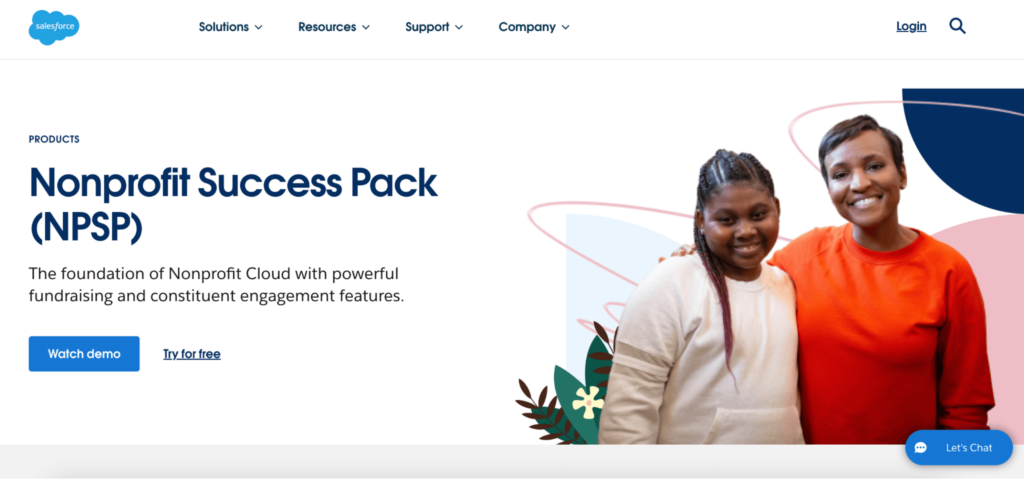

- Price: Free for up to 10 users (additional features and users require paid plans)
- Most Helpful Feature: Highly customizable to fit the specific needs of any nonprofit.
- Pro Tips: Invest time in proper training and customization to fully leverage Salesforce’s extensive capabilities.
- Usability Rating: ★★★★☆
The free version of Zoho CRM offers basic CRM features suitable for small nonprofits, including contact management, workflow automation and reporting tools.
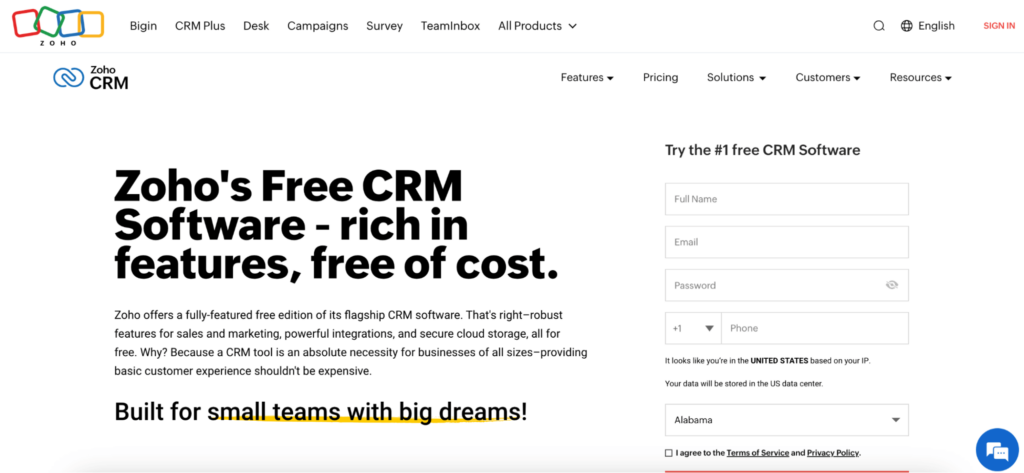

- Price: Free (limited to 3 users)
- Most Helpful Feature: Workflow automation capabilities
- Pro Tips: Use automation features to streamline repetitive tasks and ensure that you stay on top of donor engagement.
- Usability Rating: ★★★☆☆
Paid Donor Management Tools
Bloomerang is a donor management software that focuses on donor retention and engagement. It offers features for managing donors, tracking interactions and analyzing fundraising data.
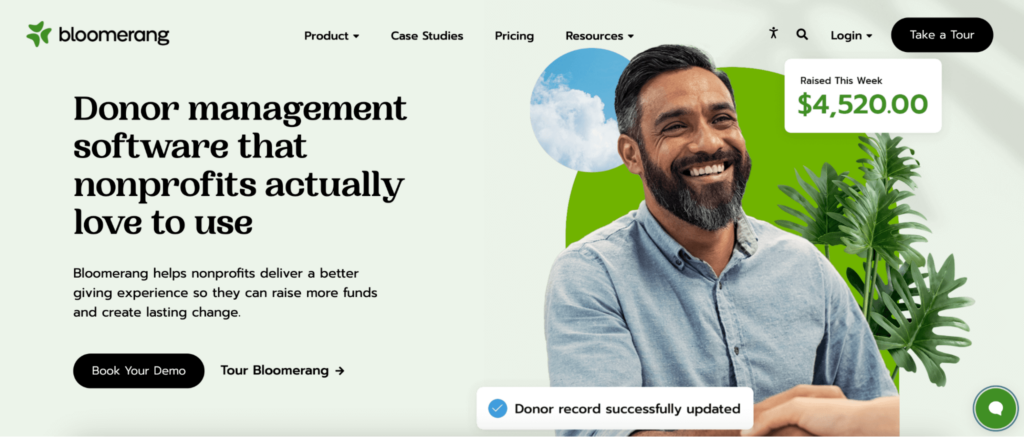

- Price: Starts at $99/month
- Most Helpful Feature: Donor retention and engagement tracking.
- Pro Tips: Use the engagement tracking features to personalize your communications and increase donor retention rates.
- Usability Rating: ★★★★☆
DonorPerfect is a donor management system designed to help nonprofits manage donor relationships, track donations and run fundraising campaigns.
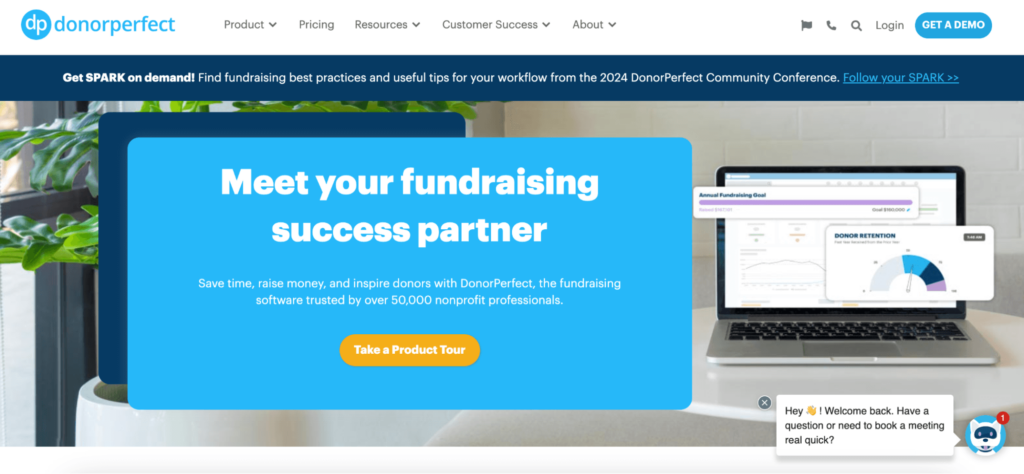

- Price: Starts at $99/month
- Most Helpful Feature: Comprehensive reporting and analytics tools
- Pro Tips: Use the reporting tools to monitor fundraising performance and identify areas for improvement.
- Usability Rating: ★★★★☆
Keela is an integrated fundraising and donor management platform designed for small to mid-sized nonprofits, with features for donor management, email marketing and reporting.
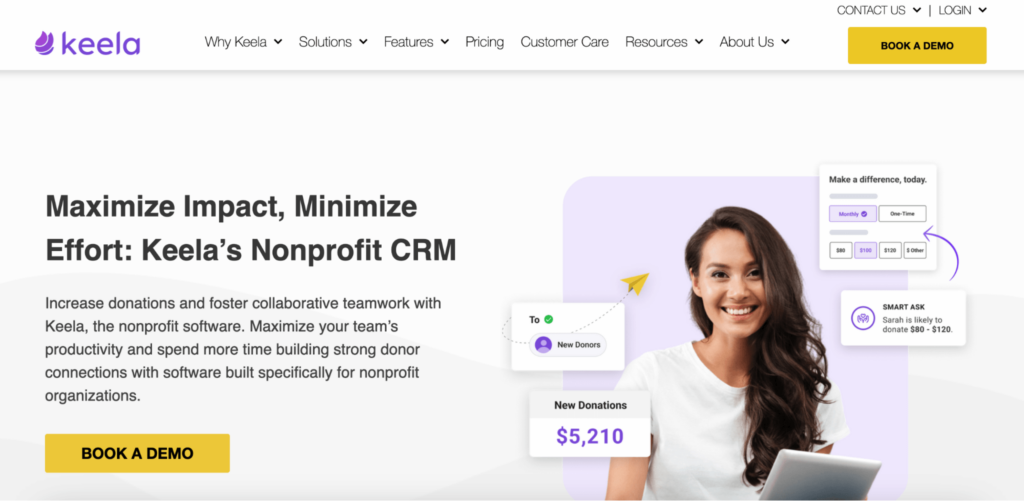

- Price: Starts at $50/month
- Most Helpful Feature: Integrated email marketing and automation tools
- Pro Tips: Leverage the built-in automation to streamline communications and ensure consistent donor engagement.
- Usability Rating: ★★★★☆
Neon One is a comprehensive nonprofit management software that includes features for donor management, fundraising, event planning and more.
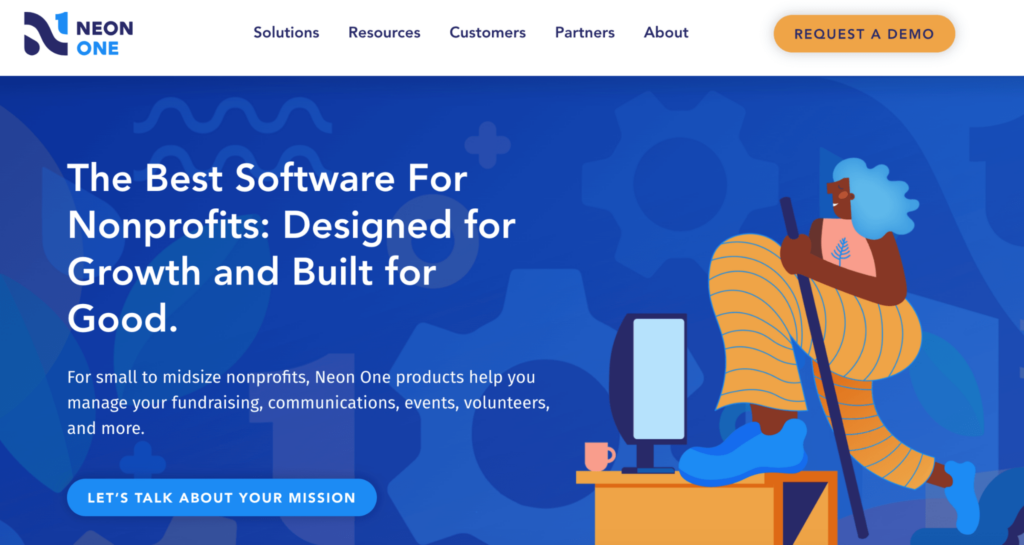

- Price: Starts at $50/month
- Most Helpful Feature: All-in-one platform with extensive integration capabilities
- Pro Tips: Utilize the integrations to connect all your tools and streamline your nonprofit’s operations.
- Usability Rating: ★★★★☆
Raiser’s Edge NXT by Blackbaud is a comprehensive donor management and fundraising solution designed for larger nonprofits. It includes features for donor management, analytics and reporting.
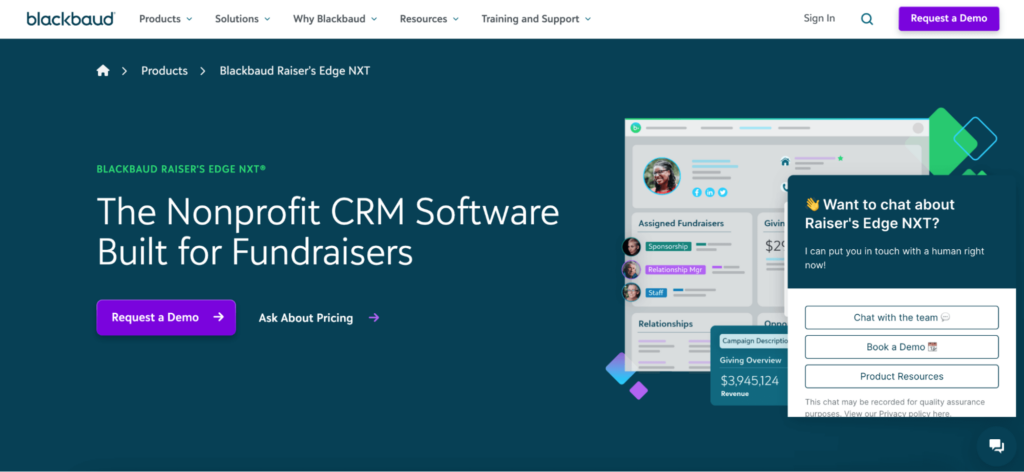

- Price: Custom pricing based on organization size and needs
- Most Helpful Feature: Advanced analytics and reporting capabilities
- Pro Tips: Take advantage of the detailed analytics to inform your fundraising strategies and improve donor retention.
- Usability Rating: ★★★★☆
Donor Management Software Criteria
Nonprofit fundraising managers searching for the ideal donor management software should keep a number of key criteria in mind when vetting vendors and options.
- Security features and data privacy compliance: Perhaps the most important criteria, donor management tools should have built-in measures in place to protect sensitive donor information and ensure compliance with relevant data protection regulations, such as the General Data Protection Regulation (GDPR) or the Health Insurance Portability and Accountability Act (HIPAA).
- Ease of use and user interface: The software should be intuitive and user-friendly, ensuring that staff can quickly learn and use the platform without extensive training.
- Customization options: The ability to tailor the software to meet the specific needs and workflows of the organization is key, including creating custom fields, workflows and reports.
- Integration capabilities with existing systems: The software should be able to seamlessly connect and operate with other tools and systems already in use by the organization, such as email marketing platforms, accounting software and CRMs. It should also be compatible with the organization’s existing IT infrastructure, including operating systems, hardware and network capabilities.
- Scalability: The software should have the capacity to handle increased data volume, users and expanded functionalities as the organization grows and evolves.
- Accessibility and compatibility with different devices: The ideal software can be accessed and used across various devices, such as desktops, laptops, tablets and smartphones, providing the utmost flexibility for users.
- Cost-effectiveness and value: The software’s pricing should ideally be justified by the features and benefits it offers. It should also fit within the organization’s budget.
- Training and support services provided: Quality training resources, customer support and technical assistance are crucial to help users effectively implement and utilize the software.
- Reporting and analytics functionalities: The right software should be capable of generating detailed reports and insights into donor data, fundraising performance and other key metrics to support informed decision-making.
- Donor communication and engagement tools: Prioritize software with features that facilitate effective communication and relationship-building with donors, such as email marketing, social media integration and personalized outreach.
- Track record and reputation of the software provider: The provider’s history, reliability and standing in the market should indicate their performance and overall trustworthiness, as well as their potential for long-term viability.
- Feedback and reviews from other nonprofit users: Opinions and experiences shared by other organizations that have used the software can be highly valuable, providing insights into its effectiveness and potential challenges.
- Flexibility to adapt to changing fundraising strategies: The right software should be able to accommodate new fundraising approaches, campaigns and strategies as the organization’s needs and goals evolve.
Since much of nonprofit work revolves around fundraising and managing donations, any nonprofit professional would benefit from familiarity with these types of tools. It is always possible to learn on the job, but a foundational understanding of nonprofit management software is an excellent skill to include on one’s resume when searching for nonprofit jobs.
If you are a current nonprofit professional or aspiring nonprofit leader, explore the Master of Science in Nonprofit Leadership and Management program at the University of San Diego. This 100%-online program was designed for working professionals with experience in the nonprofit sector who wish to expand their skill set to become stronger leaders in their field.
To learn more about the program curriculum and learning outcomes, visit the program home page or request more information today.